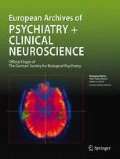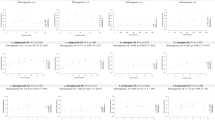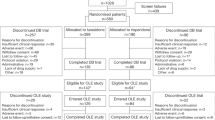Abstract
A recent randomized, open-label, relapse prevention trial (ConstaTRE) compared outcomes with risperidone long-acting injectable (RLAI) versus the oral atypical antipsychotic quetiapine. This study also included a small descriptive arm in which patients could also be randomized to aripiprazole. Results of this exploratory analysis are described here. Clinically stable adults with schizophrenia or schizoaffective disorder previously treated with oral risperidone, olanzapine, or an oral conventional antipsychotic were randomized to RLAI or aripiprazole. Efficacy and tolerability were monitored for up to 24 months. A total of 45 patients were treated with aripiprazole (10–30 mg/day) and 329 patients with RLAI (25–50 mg i.m. every 2 weeks). Relapse occurred in 27.3% (95% CI: 15.0–42.8%) of aripiprazole-treated and 16.5% (95% CI: 12.7–21.0%) of RLAI-treated patients. Kaplan–Meier estimates of mean (standard error) relapse-free period were 313.7 (20.4) days for aripiprazole and 607.1 (11.4) days for RLAI patients. Remission was achieved by 34.1% (95% CI: 20.5–49.9%) of aripiprazole and 51.1% (95% CI: 45.5–56.6%) of RLAI patients. Clinical global impression–change was improved (“minimally improved” to “very much improved”) in 26.4% with RLAI and 15.9% with aripiprazole patients. Tolerability was generally good for both treatment groups. Weight gain (7.0% with RLAI vs. 4.4% with aripiprazole), extrapyramidal adverse events (AEs) (10.3% vs. 4.4%), and potentially prolactin-related AEs (4.6% vs. 0%) were more common with RLAI treatment, and gastrointestinal disorders were more common in aripiprazole-treated patients (22.2% vs. 6.1%). Time-to-relapse in stable patients with schizophrenia or schizoaffective disorder was numerically longer in RLAI-treated patients than in aripiprazole-treated patients although not statistically significant. Both treatments were generally well tolerated.


Similar content being viewed by others
References
Schooler NR (2006) Relapse prevention and recovery in the treatment of schizophrenia. J Clin Psychiatry 67(suppl 5):19–23
Altamura AC, Bobo WV, Meltzer HY (2007) Factors affecting outcome in schizophrenia and their relevance for psychopharmacological treatment. Int Clin Psychopharmacol 22:249–267
Rosa MA, Marcolin MA, Elkis H (2005) Evaluation of the factors interfering with drug treatment compliance among Brazilian patients with schizophrenia. Rev Bras Psiquiatr 27:178–184
Leucht S, Heres S (2006) Epidemiology, clinical consequences, and psychosocial treatment of nonadherence in schizophrenia. J Clin Psychiatry 67(suppl 5):3–8
Cassano GB, Fagiolini A, Lattanzi L, Monteleone P, Niolu C, Sacchetti E, Siracusano A, Vita A (2007) Aripiprazole in the treatment of schizophrenia: a consensus report produced by schizophrenia experts in Italy. Clin Drug Investig 27:1–13
Limosin F, Azorin JM, Krebs MO, Millet B, Glikman J, Camus V, Crocq MA, Costentin J, Daléry J (2008) Present data and treatment schedule of aripiprazole in the treatment of schizophrenia. Encephale 34:82–92
Leucht S, Corves C, Arbter D, Engel RR, Li C, Davis JM (2009) Second-generation versus first-generation antipsychotic drugs for schizophrenia: a meta-analysis. Lancet 373:31–41
Dolder CR, Lacro JP, Dunn LB, Jeste DV (2002) Antipsychotic medication adherence: is there a difference between typical and atypical agents? Am J Psychiatry 159:103–108
Kane JM (2007) Treatment adherence and long-term outcomes. CNS Spectr 12(suppl 17):21–26
Linden M, Godemann F (2007) The differentiation between “lack of insight” and “dysfunctional health beliefs” in schizophrenia. Psychopathology 40:236–241
Löffler W, Kilian R, Toumi M, Angermeyer MC (2003) Schizophrenic patients’ subjective reasons for compliance and noncompliance with neuroleptic treatment. Pharmacopsychiatry 36:105–112
Yamada K, Watanabe K, Nemoto N, Fujita H, Chikaraishi C, Yamauchi K, Yagi G, Asai M, Kanba S (2006) Prediction of medication noncompliance in outpatients with schizophrenia: 2-year follow-up study. Psychiatry Res 141:61–69
Kane JM (2006) Review of treatments that can ameliorate nonadherence in patients with schizophrenia. J Clin Psychiatry 67(suppl 5):9–14
Schooler NR (2003) Relapse and rehospitalization: comparing oral and depot antipsychotics. J Clin Psychiatry 64(suppl 16):14–17
Lasser RA, Bossie CA, Gharabawi GM, Kane JM (2005) Remission in schizophrenia: Results from a 1-year study of long-acting risperidone injection. Schizophr Res 77:215–227
Gaebel W, Schreiner A, Bergmans P, de Arce R, Rouillon F, Cordes J, Eriksson L, Smeraldi E (2010) Relapse prevention in schizophrenia and schizoaffective disorder with risperidone long-acting injectable versus quetiapine: results of a long-term, open-label, randomized clinical trial. Neuropsychopharmacology 35:2367–2377
American Psychiatric Association (1994) Diagnostic and statistical manual of mental disorders, 4th edn. American Psychiatric Association, Washington, DC
Csernansky JG, Mahmoud R, Brenner R, Risperidone-USA-79 Study Group (2002) A comparison of risperidone and haloperidol for the prevention of relapse in patients with schizophrenia. N Engl J Med 346:16–22
Marder SR, Davis JM, Chouinard G (1997) The effects of risperidone on the five dimensions of schizophrenia derived by factor analysis: combined results of the North American trials. J Clin Psychiatry 58:538–546
Andreasen NC, Carpenter WT Jr, Kane JM, Lasser RA, Marder SR, Weinberger DR (2005) Remission in schizophrenia: proposed criteria and rationale for consensus. Am J Psychiatry 162:441–449
Kissling W, Heres S, Lloyd K, Sacchetti E, Bouhours P, Medori R, Llorca PM (2005) Direct transition to long-acting risperidone—analysis of long-term efficacy. J Psychopharmacol 19(suppl):15–21
Macfadden W, Ma YW, Thomas Haskins J, Bossie CA, Alphs L (2010) A prospective study comparing the long-term effectiveness of injectable risperidone long-acting therapy and oral aripiprazole in patients with schizophrenia. Psychiatry (Edgmont) 7(11):23–31
Ware J Jr, Kosinski M, Keller SD (1996) A 12-Item Short-Form Health Survey: construction of scales and preliminary tests of reliability and validity. Med Care 34:220–233
Martin CR, Allan R (2007) Factor structure of the Schizophrenia Quality of Life Scale Revision 4 (SQLS-R4). Psychol Health Med 12:126–134
Chouinard G, Ross-Chouinard A, Annable L, Jones BD (1980) Extrapyramidal Symptom Rating Scale. Can J Neurol Sci 7:233
Gharabawi GM, Gearhart NC, Lasser RA, Mahmoud RA, Zhu Y, Mannaert E, Naessens I, Bossie CA, Kujawa M, Simpson GM (2007) Maintenance therapy with once-monthly administration of long-acting injectable risperidone in patients with schizophrenia or schizoaffective disorder: a pilot study of an extended dosing interval. Ann Gen Psychiatry 6:3
Moeller KE, Shireman TI, Liskow BI (2006) Relapse rates in patients with schizophrenia receiving aripiprazole in comparison with other atypical antipsychotics. J Clin Psychiatry 67:1942–1947
Pigott TA, Carson WH, Saha AR, Torbeyns AF, Stock EG, Ingenito GG, Aripiprazole Study Group (2003) Aripirazole for the prevention of relapse in stabilized patients with chronic schizophrenia: a placebo-controlled 26-week study. J Clin Psychiatry 64:1048–1056
Bai YM, Chen TT, Wu B (2006) A comparative efficacy and safety study of long-acting risperidone injection and risperidone oral tablets among hospitalized patients: 12-week randomized, single-blind study. Pharmacopsychiatry 39:135–141
Komossa K, Rummel-Kluge C, Schmid F et al (2010) Quetiapine versus other atypical antipsychotics for schizophrenia. Cochrane Database Syst Rev CD006625
Komossa K, Rummel-Kluge C, Schmid F et al (2009) Aripiprazole versus other atypical antipsychotics for schizophrenia. Cochrane Database Syst Rev CD006569
Acknowledgments
The study, editorial and writing support were sponsored by Janssen Pharmaceutical Companies of Johnson & Johnson in EMEA. The authors would like to acknowledge Dr Rossella Medori for trial design and medical conduct supervision. Dr Medori was European Medical Director at Janssen–Cilag during study conduct and analysis. Paul Bergmans from Janssen–Cilag BV, Netherlands, is also acknowledged for providing statistical analyses. Editorial and writing support was provided by Remon van den Broek and team from Excerpta Medica.
Conflict of interest
Dr De Arce has received research grants, and served as consultant, advisor, or speaker for the following companies: AstraZeneca, Bristol–Myers Squibb, Eli Lilly, GlaxoSmithKline, Janssen–Cilag, Novartis, Bristol, Pfizer Inc, sanofi-aventis, and UCB Pharma. Dr Eding declares to have no conflict of interest. Dr Marques–Teixeira declares to have no conflict of interest. Dr Milanova declares to have no conflict of interest. Dr Rancans has received speaker fees from Gedeon Richter, Grindeks, sanofi-aventis, and Servier, consultancy fees from Gedeon Richter; and investigator fees from Janssen–Cilag. Dr Schreiner is a full employee of Janssen–Cilag GmbH, Germany.
Author information
Authors and Affiliations
Corresponding author
Rights and permissions
About this article
Cite this article
de Arce Cordón, R., Eding, E., Marques-Teixeira, J. et al. Descriptive analyses of the aripiprazole arm in the risperidone long-acting injectable versus quetiapine relapse prevention trial (ConstaTRE). Eur Arch Psychiatry Clin Neurosci 262, 139–149 (2012). https://doi.org/10.1007/s00406-011-0220-8
Received:
Accepted:
Published:
Issue Date:
DOI: https://doi.org/10.1007/s00406-011-0220-8




